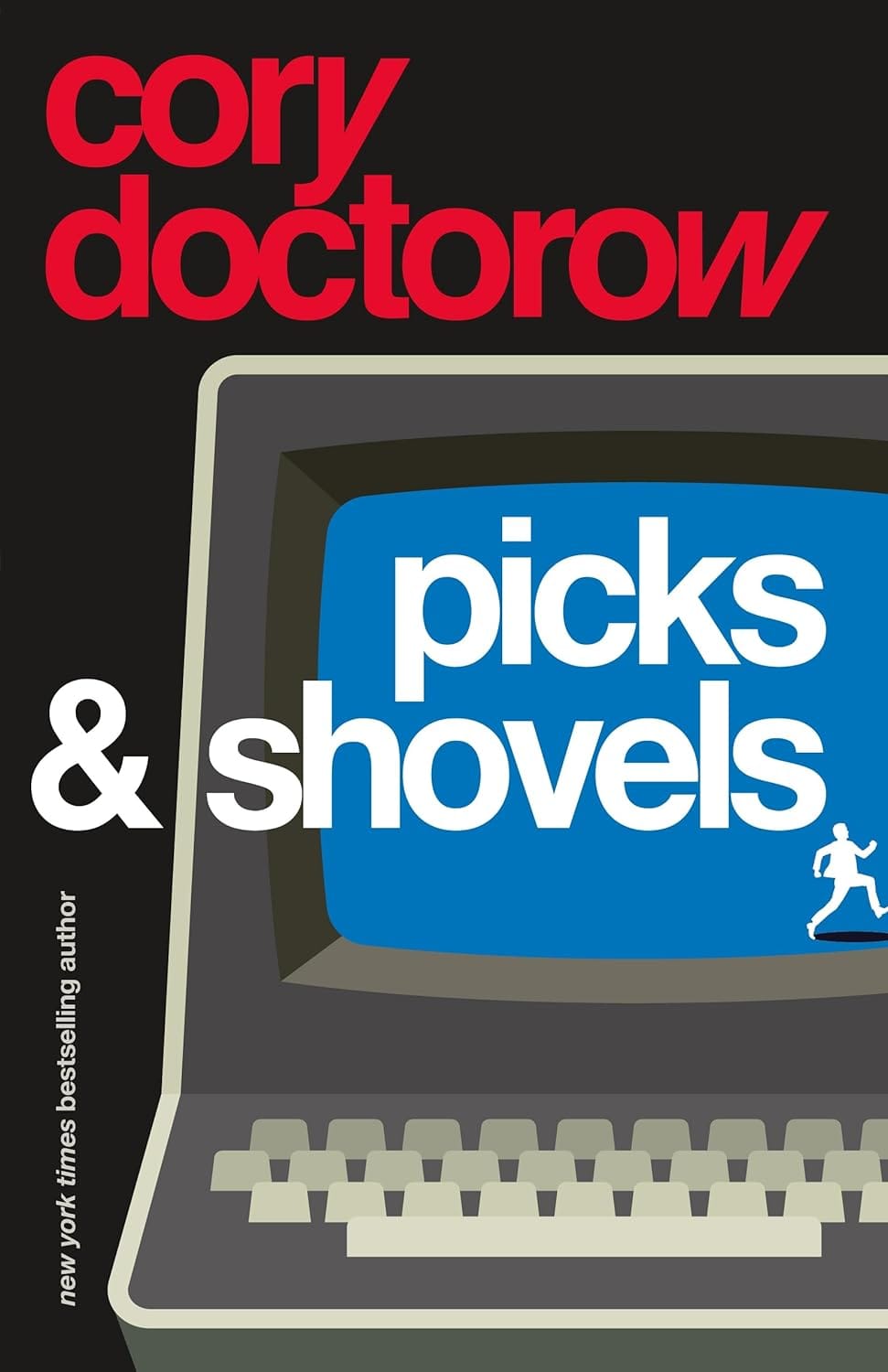Cory Doctorow's Picks & Shovels is out today (and it's great fun)

I seem to have acquired a new annual tradition. For the past couple years, every winter I go on a long road trip and I stack up audiobooks to listen to along the way. Since 2023, I've taken trips that happened to include Cory Doctorow's newest book. I loved the heck out of Red Team Blues in 2023, then last year I enjoyed The Bezzle on another long trip. Last month I listened to Picks & Shovels over the course of a couple days driving across California on the way to Utah.
Setting the stage
This book is the third installment in a series about an unlikely main character, a forensic accountant by the name of Martin Hench, who loves to root out nefarious financial dealings deep in tech. Doctorow wrote the first book as if the reader were catching a book series late in its arc, as the main character was around 60 and close to retirement going back in to do "one last job". The book was a success, and then suddenly Cory had to retcon future books as "previous" titles. The Bezzle is set in 2006 and Marty Hench is firmly in the middle of his career. Picks & Shovels is set around 1986 at the dawn of the personal computer revolution, and fills in a lot of blanks about how he got started from college to his first big unraveling of a heist.
They're all enjoyable books in the series that stand on their own but I might like Picks & Shovels the most of all three. It covers a time from the late 1970s when computers were just getting started in the lives of normal folks, zooms through the 1980s and ends near the tail end of the decade.
I'll try not to post spoilers and only talk in broad strokes.
Stuff that was great
What I liked most about the story was a sense of realism around the tech industry.
Sure, there are fanciful aspects of the story that don't feel entirely real but it's all rooted in how tech companies get talked about and how mergers and acquisitions and their clueless leaders actually behave in the real world. What I loved most about this book was it felt realistic to my own experiences in the industry over the past 25-30 years after being through a few acquisitions myself.
One of my favorite books from the mid-1990s was Microserfs, and I read it when it debuted, just as I was starting my own tech career. I loved all of Douglas Coupland's books back then for the realistic-sounding patter among the 20-something year old characters, but as enjoyable as that book was, I never liked the fairy tale ending of it all. In it, a bunch of nerds do nerd stuff and eventually they start their own company and it becomes a hit and everyone comes out of it a gazillionaire. It was fun as a fantasy story.
The actual tech industry isn't like that, and even the best outcomes I've seen were riddled with monkey's paw-like drawbacks and downsides for everyone involved. The world is a lot more complicated than fairy tales, and Picks & Shovels felt more grounded in reality.
Another thing I loved—since the main character is in their early 20s for most of the story (with some flashbacks to their teens)—Doctorow hides a bunch of "how to be a decent human being that cares for others" lessons in plenty of examples of how Marty interacts with people. I honestly don't think young guys today have very many good role models that tell them how to be a good person to one another. Instead, there's a cottage industry of grifters trying to tell men they're weaklings who need to be "tough" and being shitty to others is ok since it usually means getting a leg up on others.
Every few chapters, Marty Hench gets in an argument with someone and gets defensive but then later realizes the error of his ways and learns a lesson, which was fun to read. I love the idea that one of Doctorow's earlier books, Little Brother, was a pretty big hit as a YA novel, and those same readers are now grown up and could use some straight talk on how to be a good person to others and within a society.
As always, the audiobook is extraordinary. Will Wheaton narrates it like an old time radio play, doing voices for every character and reads it with a joy that's infectious. Also, since the main character is a young guy, it matches well with Wheaton's voice and he really helps bring the story to life.
Did Cory write himself into a corner?
I hope there are more books in this series, but since this one covers the pre-history of Marty Hench's life, and we already got the present-day version in the first book, then a 2006 middle-age story as the second book, I hope Cory can somehow wedge a 1997-2000 story of adventures from San Francisco at the dawn of the web age into the Marty Hench timeline. Or maybe he can make future stories that come after Red Team Blues, set in the present and near-future.
There are difficult passages in this book worth mentioning. Since it's set in the 1980s, AIDS and HIV and general panic around gays shows up from time to time and there's an extended passage on what it really, truly means to suffer a "gay bashing" and it's quite graphic and visceral and as tough it was to listen to an entire chapter spent talking about suffering through a near-death experience, it drove the point home of just how traumatic those kinds of attacks are.

So where can I find this book?
You can buy Picks & Shovels directly off Cory's website. If you have the time, get the audiobook, as you won't regret it. You can even preview the first chapter on his blog today.
I can always tell when I love a book because I wish there were more stories about the same characters. I have no idea if there will be future installments in this series, but I certainly hope so.
Subscribe to our newsletter.
Be the first to know - subscribe today

